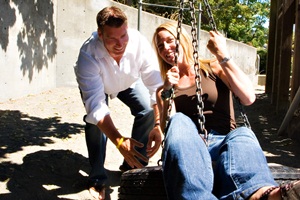 It was Plato who said “You can discover more about a person in an hour of play than in a year of conversation.” Play is important not only for children, but for adults too. All work and no play may “make Jack a dull boy”, but it also makes Jack a worse corporate manager. According to a number of studies, those whose lives don’t include play have an increased risk of mental health issues, diseases related to stress, addiction and violence.
It was Plato who said “You can discover more about a person in an hour of play than in a year of conversation.” Play is important not only for children, but for adults too. All work and no play may “make Jack a dull boy”, but it also makes Jack a worse corporate manager. According to a number of studies, those whose lives don’t include play have an increased risk of mental health issues, diseases related to stress, addiction and violence.
Dr. Stuart Brown, founder of the National Institute for Play says, “What do most Nobel Laureates, innovative entrepreneurs, artists and performers, well-adjusted children, happy couples and families, and the most successfully adapted mammals have in common? They play enthusiastically throughout their lives.” As we get older, however, we encounter barriers to playing. We not only have far less time to play, given the demands of work and family, but play is often frowned upon by our peers, who feel we should not be “goofing off” during the day when we have important responsibilities to meet. Nevertheless, play is as important to our long-term wellbeing as sleep, eating well and exercising.
Brown has researched the role of play in our lives and points out that most serial killers were deprived of play as children. Play stimulates the areas of the brain responsible for memory and clarity. It also encourages the development of creative strategies for dealing with problems. Play can help make you more productive and innovative at work too. When a problem comes up at work, studies have shown that those who take time out to play a quick game of basketball in the company parking lot or who take a break with colleagues to go out for a few laughs come back feeling refreshed and can approach the problem from a different perspective.
Play is also important to keeping relationships new and interesting. Couples who play together develop better communication skills, foster a greater sense of trust and increase their ability to cooperate. Play stimulates the area of the brain that processes emotions, allowing us to deal with stress in a constructive way rather than taking it out on our partner.
Children are often discouraged from roughhousing on the playground, but research has shown that this is actually an important means of developing social skills. The practice it provides in give-and-take allows children to hone problem-solving skills that will be necessary for them to use as they get older. Studies performed on rats showed that rats prevented from playing in a rough-and-tumble manner when they are young more often develop significant social problems when they reached adulthood and many are never able to mate.
No matter what your age, take some time each day to play and rediscover the joy and energy that play brings to your life.

